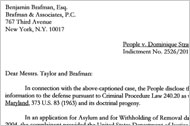Twenty-eight hours after a housekeeper at the Sofitel New York said she was sexually assaulted by Dominique Strauss-Kahn, she spoke by phone to a boyfriend in an immigration jail in Arizona.
Strauss-Kahn Accuser’s Call Alarmed Prosecutors
By JIM DWYER and MICHAEL WILSON
Multimedia
Related
-
Strauss-Kahn Is Released as Case Teeters (July 2, 2011)
-
News of Turnaround in Dominique Strauss-Kahn Case Stuns France (July 2, 2011)
-
Accuser’s Fellow Guineans Express Bewilderment (July 2, 2011)
-
Times Topic: Dominique Strauss-Kahn
Investigators with the Manhattan district attorney’s office learned the call had been recorded and had it translated from a “unique dialect of Fulani,” a language from the woman’s native country, Guinea, according to a well-placed law enforcement official.
When the conversation was translated — a job completed only this Wednesday — investigators were alarmed: “She says words to the effect of, ‘Don’t worry, this guy has a lot of money. I know what I’m doing,’ ” the official said.
It was another ground-shifting revelation in a continuing series of troubling statements, fabrications and associations that unraveled the case and upended prosecutors’ view of the woman. Once, in the hours after she said she was attacked on May 14, she’d been a “very pious, devout Muslim woman, shattered by this experience,” the official said — a seemingly ideal witness.
Little by little, her credibility as a witness crumbled — she had lied about her immigration, about being gang raped in Guinea, about her experiences in her homeland and about her finances, according to two law enforcement officials. She had been linked to people suspected of crimes. She changed her account of what she did immediately after the encounter with Mr. Strauss-Kahn. Sit-downs with prosecutors became tense, even angry. Initially composed, she later collapsed in tears and got down on the floor during questioning. She became unavailable to investigators from the district attorney’s office for days at a time.
Now the phone call raised yet another problem: it seemed as if she hoped to profit from whatever occurred in Suite 2806.
The story of the woman’s six-week journey from seemingly credible victim, in the eyes of prosecutors, to a deeply unreliable witness, is drawn from interviews with law enforcement officials, statements from the woman’s lawyer and a letter from prosecutors to Mr. Strauss-Kahn’s defense team released in court on Friday. Some of the events were confirmed by both law enforcement officials and the women’s lawyer; others rely solely on law enforcement officials. In the end, it was the prosecutors’ assessment of the housekeeper’s credibility that led them to downgrade their confidence in the case and agree on Friday that Mr. Strauss-Kahn could be freed from house arrest.
In the beginning, her relationship with prosecutors was strong. Her account seemed solid. Over time, the well-placed official said, they discovered that she was capable of telling multiple, inconsistent versions of what appeared to be important episodes in her life. After the encounter with Mr. Strauss-Kahn, she asked her supervisor at Sofitel, “Can any guest at the hotel do anything they want with us?” her lawyer, Kenneth P. Thompson, said during a sidewalk press conference on Friday defending her.
The supervisor called security, and officers, finding semen on the floor and wall, called the police, setting off the quick chain of events that led to police officers escorting Mr. Strauss-Kahn off an Air France plane set to depart Kennedy International Airport.
Suspicions of the woman’s associations arose relatively quickly: within a week of Mr. Strauss-Kahn’s arrest, the authorities learned of a recorded conversation between the subject of a drug investigation and another man, who said his companion was the woman involved in the Strauss-Kahn matter, according to another law enforcement official.
Prosecutors and investigators interviewed the woman at length.
Her immigration history was a focus. At first, she told them what she told immigration officials seven years ago in her accounts of how she fled Guinea and her application for asylum on Dec. 30, 2004. She described soldiers destroying the home where she lived with her husband, and said they were both beaten because of their opposition to the regime. She said her husband died in jail.
But then, in a subsequent interview with Manhattan prosecutors, she said the story was false, one she had been urged to tell by a man who gave it to her on a cassette recording to memorize. She had listened to the recording repeatedly.
The housekeeper also told investigators that she had been gang raped in Guinea. She cried and became “markedly distraught when recounting the incident,” according to a letter to the defense from prosecutors released Friday. But she later admitted that that, too, was a lie, once again one she had told to help her application for asylum. She said she was indeed raped in Guinea, but not in the way she had described.
Her lawyer, Mr. Thompson, said she was desperate to leave Guinea, and had been encouraged to embellish her application for asylum.
The boyfriend in the Arizona detention center was another issue. He had been arrested while bartering counterfeit designer clothing from Manhattan’s Chinatown for marijuana in the Southwest, the well-placed law enforcement official said. Her lawyer said she did not know the man was “a drug dealer.”
Meanwhile, as the interviews continued, the relationship grew more strained. During a meeting at the district attorney’s office on June 9, the woman wept as she was questioned closely after Mr. Thompson had left for another engagement. Her 15-year-old daughter, who was waiting outside, noticed that her mother was upset and called a relative to alert Mr. Thompson. The lawyer called the prosecutors and demanded an end to the questioning. He said on Friday that the daughter heard them shout, “Get out! Get out! Get out of here!” at her mother. The authorities say there was no shouting.
At another meeting, the woman threw herself to the floor in response to questions, the well-placed official said.
Then, for some 10 days, prosecutors were unable to get Mr. Thompson to bring her in; the lawyer said she was being treated for a shoulder injury that she suffered in the attack, an injury she had not reported earlier.
The final meeting occurred on Tuesday in the seventh-floor offices of the district attorney at 1 Hogan Place. It began at 11 a.m. and lasted five or six hours, except for a short lunch break, around an oval table in a conference room in the offices of the Public Integrity Unit.
It was devastating. In recent weeks, investigators collected bank records showing deposits of thousands of dollars in Arizona, Georgia, New York and Pennsylvania to an account in her name.
The woman had repeatedly said that the Sofitel was her only source of income.
Now, investigators confronted her with the bank records.
The woman, silent, turned to Mr. Thompson, seemingly pleading for direction on how to respond. He seemed startled.
“He was speechless,” the well-placed official said.
The district attorney’s office said the woman had lied about her income to maintain her public housing, and had claimed a friend’s child as her own dependant to increase her tax refund.
At the same meeting, the woman gave a new version of what she had done immediately after the encounter with Mr. Strauss-Kahn. In testimony before the grand jury in May, she said she had fled Suite 2806 to an area in the main hallway and waited until she saw Mr. Strauss-Kahn leave in an elevator. She has said that her supervisor arrived a short time later, and that she told her supervisor what had happened.
On Tuesday, the well-placed official said, she told investigators new details, stating, “I forgot to tell you this.”
In fact, she said, she left Mr. Strauss-Kahn’s room and entered another room — her lawyer said it was Suite 2820 — and cleaned it, and then returned to Suite 2806 and cleaned it until her supervisor arrived.
“She did not know what to do,” her lawyer said. “She did not want to lose her job. She knew that her supervisor was going to be coming upstairs momentarily. So, she went into another room.”
And yet, even this version was not corroborated by card-key data obtained by investigators on Friday, which indicated that the housekeeper went to the other room only after she had finished Mr. Strauss-Kahn’s room.
Some within the district attorney’s office suggested that the rush to bring the case to a grand jury may have contributed to its current, weakened state.
Early on, there appeared to be disagreement in the office over how to proceed — whether to agree to a bail package for Mr. Strauss-Kahn and take more time to investigate before seeking his indictment, or whether to try to keep him locked up and quickly take the case to the grand jury for an indictment, according to three people involved in the case.
The office chose to seek a quick indictment, but a Manhattan judge let Mr. Strauss-Kahn out on bail anyway.
Mr. Thompson said that the housekeeper’s account of what took place in Suite 2806 is the only one that matters, and said that in the jail recording, she recounted a version of the encounter that matched what she had told the police.
“It’s a fact that the victim here has made some mistakes, but that doesn’t mean she’s not a rape victim,” Mr. Thompson said Friday.
The woman has been crushed that her inconsistent statements have been brought to light, Mr. Thompson said. “I will go to my grave knowing what this man did to me,” she told him on Friday, he said.
- © 2011 The New York Times Company. Reprinted from The New York Times, New York Region, of Saturday, July 2, 2011.


